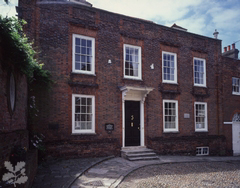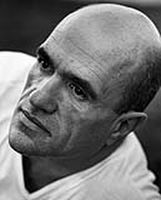Wednesday, April 27, 2005
Somewhere else

I’m reading The Master by Colm Toíbín, his novel, or fictionalised biography, about Henry James. A fine and unusual book, whose quiet majesty has slowly dawned on me as I read. I’ve been reading it on the bus, going to and from work – the only good thing about a bus journey of more than an hour – and was near the end this morning when the bus crossed the river, the next stop was mine, and I wished it wasn’t.
So, not really having the time, but unable to resist, I took the book when I went for lunch in the student canteen. Buried myself in it at once as I absently forked up my chile con carne – not good for the digestion, or for the front of my sweater.
It doesn’t dominate the book, but Toíbín, who’s gay, weaves a thread of gentle speculation about James’s sexuality and opts for the version where he was attracted to men, but led a life entirely of the mind. I arrive, over the chile con carne, in a cavernous room crowded with noisy young people, at this passage:
[1899. James, aged 56, is with Henrik Andersen, the young sculptor he’s befriended, in the study at his house in Rye, where he’s recently moved and will live for the rest of his life – the house, which I have visited, has been evoked with strong physical detail]
‘This is where all your work is done,’ Andersen said when Henry had closed the door behind them.
‘This is where the tales are told’, Henry said.
To the left of the entrance there was a wall of books, and when Andersen had studied the view and marvelled at the light, he walked over to inspect the books, not appearing to realise at first that all of them bore his host’s name. He took down one or two and then gradually it seemed to dawn on him that this large high bookcase contained the novels and stories of Henry James in all their editions from both sides of the Atlantic. He became agitated and excited as he took volumes down and looked at the spines and the title pages.
‘You have written a whole library’, he said. ‘I will have to read them all’.
He turned to look at Henry.
‘Did you always know that you would write all these books?’
‘I know the next sentence,’ Henry said, ‘and often the next story and I take notes for novels.’
‘But did you once plan it all? Did you not say this is what I will do with my life?’
By the time he asked the second question, Henry had turned away from him and was facing towards the window with no idea why his eyes had filled with tears.


Finding my plate empty, I get up reluctantly to take my tray to the racks from where plates and cutlery are cleared away; stand there, book in one hand, tray in the other. The tray won’t fit into the rack; it’s too narrow. I keep trying, then apologetically thrust it at the young man who’s just come to start clearing. ‘I seem to have an extra-small tray’. Odd look. ‘It’s the wrong way round’. Yes, I’m holding it the wrong way round. I’ve been eating here for three years. But I’m not here, I’m in Rye in 1899.
I wrote a while ago about no longer finding fiction enough, being keener on presence in the real world, less keen to disappear into imagination. Well, thankfully, there’s an exception to almost everything.

I’m reading The Master by Colm Toíbín, his novel, or fictionalised biography, about Henry James. A fine and unusual book, whose quiet majesty has slowly dawned on me as I read. I’ve been reading it on the bus, going to and from work – the only good thing about a bus journey of more than an hour – and was near the end this morning when the bus crossed the river, the next stop was mine, and I wished it wasn’t.
So, not really having the time, but unable to resist, I took the book when I went for lunch in the student canteen. Buried myself in it at once as I absently forked up my chile con carne – not good for the digestion, or for the front of my sweater.
It doesn’t dominate the book, but Toíbín, who’s gay, weaves a thread of gentle speculation about James’s sexuality and opts for the version where he was attracted to men, but led a life entirely of the mind. I arrive, over the chile con carne, in a cavernous room crowded with noisy young people, at this passage:
[1899. James, aged 56, is with Henrik Andersen, the young sculptor he’s befriended, in the study at his house in Rye, where he’s recently moved and will live for the rest of his life – the house, which I have visited, has been evoked with strong physical detail]
‘This is where all your work is done,’ Andersen said when Henry had closed the door behind them.
‘This is where the tales are told’, Henry said.
To the left of the entrance there was a wall of books, and when Andersen had studied the view and marvelled at the light, he walked over to inspect the books, not appearing to realise at first that all of them bore his host’s name. He took down one or two and then gradually it seemed to dawn on him that this large high bookcase contained the novels and stories of Henry James in all their editions from both sides of the Atlantic. He became agitated and excited as he took volumes down and looked at the spines and the title pages.
‘You have written a whole library’, he said. ‘I will have to read them all’.
He turned to look at Henry.
‘Did you always know that you would write all these books?’
‘I know the next sentence,’ Henry said, ‘and often the next story and I take notes for novels.’
‘But did you once plan it all? Did you not say this is what I will do with my life?’
By the time he asked the second question, Henry had turned away from him and was facing towards the window with no idea why his eyes had filled with tears.


Finding my plate empty, I get up reluctantly to take my tray to the racks from where plates and cutlery are cleared away; stand there, book in one hand, tray in the other. The tray won’t fit into the rack; it’s too narrow. I keep trying, then apologetically thrust it at the young man who’s just come to start clearing. ‘I seem to have an extra-small tray’. Odd look. ‘It’s the wrong way round’. Yes, I’m holding it the wrong way round. I’ve been eating here for three years. But I’m not here, I’m in Rye in 1899.
I wrote a while ago about no longer finding fiction enough, being keener on presence in the real world, less keen to disappear into imagination. Well, thankfully, there’s an exception to almost everything.
Comments:
<< Home
My favorite Henry James anecdote is about a time Virginia Woolf and some of the other Bloomsburyites visited him in Rye. He was pushing a wheelbarrow in his garden. He said, "I bought this wheelbarrow with the royalties from my last novel. With the royalties from my next, I shall paint it."
What a beautiful post this is. I do see what Dale's going on about.
And those photos of James and Toibin! Striking similarity, and each oozes intelligence.
Abdul-Walid
And those photos of James and Toibin! Striking similarity, and each oozes intelligence.
Abdul-Walid
what a beautiful exchange of thoughts and imaginings (found via dale at koshtra.com)
how very lovely to be there and here at the same time, even while I'm trying to help you make the tray fit
it just doesn't fit, now does it?
ntexas99
how very lovely to be there and here at the same time, even while I'm trying to help you make the tray fit
it just doesn't fit, now does it?
ntexas99
My favorite Henry James anecdote is actually a Mark Twain anecdote. Twain reportedly, upon finishing The Beast in the Jungle, threw the book across the room and exclaimed, "That son of a bitch has finally done it! He's written a book in which nothing happens!"
Oh, Jean, another wonderful post. I hope Dale's very accurate assessment will send you more richly-deserved readers.
Post a Comment
<< Home



